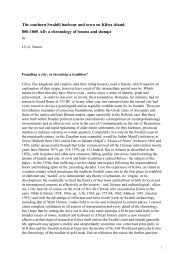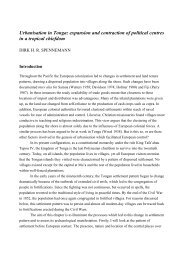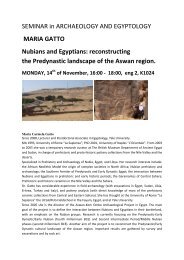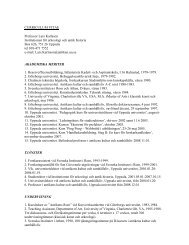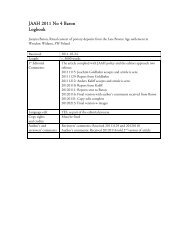Beowulf - Institutionen för arkeologi och antik historia
Beowulf - Institutionen för arkeologi och antik historia
Beowulf - Institutionen för arkeologi och antik historia
Create successful ePaper yourself
Turn your PDF publications into a flip-book with our unique Google optimized e-Paper software.
the first poem to express the united opinions of King, court and people, but not<br />
necessarily his own mind since his opinion is not officially called for.<br />
The reasons for praising Lupus need not logically be specific—his position at<br />
Sigibert’s court is sufficient, but in the case of Lupus this kind of double elucidation of<br />
specific events, the German and the Latin appreciation of his return, fits Lupus’ character,<br />
his ambition at the Austrasian court and perhaps his vanity.<br />
In the second poem Venantius takes care to point out that Lupus embraces both<br />
classical and Germanic ideals and it is therefore no more than right that Venantius,<br />
who understands both, should find it fitting to praise Lupus in a rather pompous and<br />
Germanic way as well as with his somewhat sugary late-classical dulcedo (cf.<br />
Koebner 1915, pp. 34 f.). In the Austrasian setting this is a matter of praising the<br />
Germanic ideal officially in the king’s hall and then praising the classical ideal in the<br />
private poem, which is to be read rather than recited. There are two sides of Lupus,<br />
and Venantius, seeking a patron, knows both of them.<br />
Although the two panegyrics cannot logically be linked to the same historical situation,<br />
it seems quite in keeping with Venantius’ role as an intermediate between Classical<br />
and Germanic culture to depict the same historical situation in two different and<br />
complementary ways. It is, moreover, consistent with Lupus role to be flattered by<br />
both types of panegyric, and the two poems are obviously structured to link the two<br />
ideals.<br />
The first starts with a reference to the Roman Republic and tells us that with Lupus<br />
those happy days are brought back to us, but the rest of the poem is concerned<br />
solely with the Germanic ideal and the references to Cato, Scipio and Pompey are<br />
there only to prove the similarity between Roman and Germanic respect for the<br />
welfare of the people. In the other poem the allusion to the Germanic ideal – the<br />
lieder of the barbarians – occupies very little space, but it is a reference that presupposes<br />
knowledge of the first poem. On the other hand, the Late Classical ideal of<br />
letting nature reflect the sentiments of a human being and transferring these general<br />
sentiments to a specific person and his situation, namely the stranger Venantius in the<br />
Germanic world, is most elaborate. Venantius is welcomed in this world by Lupus<br />
who, instead of acting the way Venantius expected a Germanic chieftain or patron to<br />
do, he acts like a father or a mentor, with confidence in the young Venantius. So,<br />
despite his being the perfect Germanic official hero of the poetry which is sung to a<br />
crotta, harp or lyre, he is also a most devoted individual.<br />
We can see that Lupus is in fact engaging Venantius in a relationship of goodness<br />
in the same way as Hroðgar started a relationship with the child <strong>Beowulf</strong> simply by<br />
recognising him, but we cannot be sure that Venantius understands the meaning of<br />
Lupus’ kindness.<br />
112



